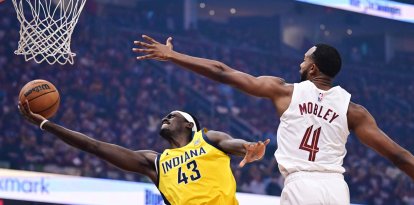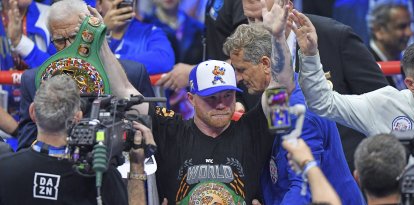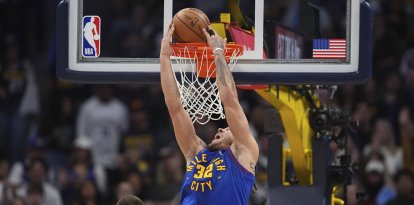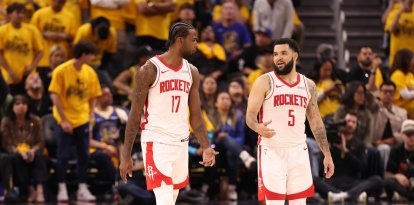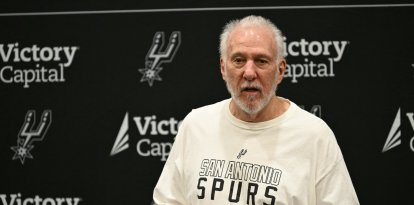Real Madrid vs. Borussia Dortmund: The keys to the Champions League final
The Spanish team, the titan of the competition, faces a traditional German team that has become the Cinderella of the world's top club soccer tournament.
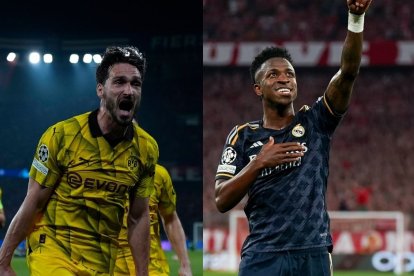
Mats Hummels, del Borussia Dortmund; y Vinícius Jr., delantero del Real Madrid. (Cordon Press)
Everything is ready for Real Madrid and Borussia Dortmund clash at the legendary Wembley Stadium in London, the venue for the final of the UEFA Champions League, the most important club tournament on the planet.
This Saturday, at 3 p.m. E.T., the team from the Spanish capital, the winningest in the history of the competition (14), will seek to win its 15th “Orejona” against the Cinderella of the tournament, Dortmund, which quietly reached the defining match leaving teams like PSG, Atlético de Madrid and PSV behind; overcoming, in addition, the feared “group of death” in the first round of the tournament.
However, Madrid's road to the final was even more turbulent.
In the semifinals, they eliminated Dortmund's archrival Bayern Munich with an epic late comeback in the second leg. In the quarterfinals, Carlo Ancelotti's team overcame Pep Guardiola's Manchester City, one of the best teams in the world, in a heart-stopping draw that went to penalty kicks.
There is a clear favorite for the final, Real Madrid, the team with the most individual talent on the field and also the one that has performed the best so far. In fact, the “Merengue's” dominance is so unquestionable that even bookmakers are paying absolutely disparate five-to-one odds for an unlikely victory by the German team.
This figure indicates a priori the distance between the two teams, but like any cold number, it forgets and leaves out the all-important context.
What do Real Madrid have to worry about?
Getting right into the match, the line-ups are practically set. For Real Madrid, there are practically no doubts, with the confirmed absence of French midfielder Tchouaméni and the recovery of goalkeeper Courtois, their starting XI will be as follows: (4-3-1-2 in diamond) Courtois; Carvajal, Nacho, Rudiger, Mendy; Kroos, Camavinga, Valverde, Bellingham; Vinicius Jr. and Rodrygo.
The only doubt, considering that Ancelotti practically confirmed that the Belgian goalkeeper would start over Lunin, is whether Brazilian defender Militao can earn a place over Nacho.
For Dortmund, the starting XI could be the same that eliminated PSG in France: (4-3-3-3 or 4-2-3-1) Kobel; Ryerson, Hummels, Schlotterbeck, Maatsen; Sabitzer, Can, Brandt; Sancho, Adeyemi; Füllkrug, Adeyemi.
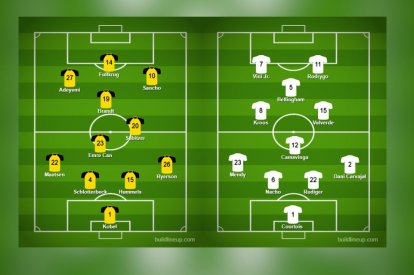
Alineaciones Real Madrid. Borussia Dortmund
Possible lineups for the Champions League final. Images created with buildlineup.com
If you are not a big soccer fan, here is a brief description of both teams.
Real Madrid likes to, above all, have possession and attack by grouping their players around the ball. It is very common to see Madrid's best players (Kroos, Vinicius, Valverde, Bellingham, Rodrygo, etc.) approach, set up combinations in tight spaces, build walls and use a lot of dribbling to generate advantages in the attack. This style has led Ancelotti's Madrid to become one of the best teams in the world and the century.
Borussia Dortmund is a pragmatic team. Unlike Real Madrid, the team led by Edin Terzic has proven to know how to adapt to each opponent throughout the season and come up with different strategies in different scenarios. For example, against PSG, they played two very different games in the first and second leg; being more aggressive at home and more reactive away, when they had to control the outcome of the game. Against Atlético Madrid, they also showed that they can play attacking, fast-paced soccer when it was their turn to look for a comeback. Meanwhile, unlike Madrid, Dortmund have had a very up-and-down season, finishing fifth in the German league. The Spanish team came out on top in its domestic competition.
For this reason, Madrid must, first of all, worry about their game. It is very common for solid, functional teams with a defined idea to betray themselves by thinking about the opponent excessively before focusing on playing the soccer that has gotten them to where they are.
That said, Ancelotti's team cannot neglect two Dortmund players: Jadon Sancho (10) and Julian Brandt (19), the most talented, unbalanced and difference-making men on the German team. Both have the ability to find space in the inside lanes, disrupt defensive lines and create clear goal-scoring opportunities with their creativity. Therefore, without fear of error, one can say that much of the German team's hopes lie at the feet of these two players.
Another interesting wrinkle for Dortmund are Sabitzer's unmarked runs from the midfield and the aerial power with their tall defenders and their tank forward Fullkrug.
Terzic's approach will also be key. The first 15 minutes will be fundamental to know how Dortmund will play and how they will try to take Madrid out of their comfort zone: attacking at the start, retreating and looking to counter-attack, biting in midfield with many men congesting the area? That will be an interesting tactical detail that can only be distinguished tomorrow, after the first whistle.
Background and relevant data
After the brief soccer review of the final, there are some facts one should take into account before sitting down to watch the game.
Madrid's record in finals is enviable. They have played in 17 and won 14. They only lost in three, in 1962, 1964 and 1981; to Benfica, Inter Milan and Bayern Munich, respectively.
Dortmund, on the other hand, has only played in two. They won in 1997 in a final where they beat Juventus 3-1. They lost in the 2013 final, falling 2-1 to Bayern.
The second thing is that the record between Borussia Dortmund and Real Madrid is quite even. They have met 14 times, all in the Champions League, and the team from the Spanish capital has won six, while the German team won three times and the teams drew five times.
However, it is worth remembering the 2013 semifinals, where although Dortmund lost 2-0 in Madrid, they qualified for the Champions League final that year thanks to a hat-trick from Robert Lewandowski in Germany.
However, Madrid overcame Dortmund in two of three Champions League matchups they faced. In the 1997-98 season, in a semifinal that ended 2-0 on aggregate for La Casa Blanca; and in 2013-14, with the aggregate ending 2-3 for Los Merengues. In both seasons, Madrid went on to win the Champions League.
The other interesting fact has to do with Wembley, the home of the final.
This mythical stadium has hosted seven Champions League finals, 1963, 1968, 1971, 1978, 1992, 2011 and 2013, the year in which Dortmund lost the final against their biggest rivals, Bayern Munich, after eliminating Real Madrid in the semis.
Madrid, although it is the team with the most finals in the history of the competition, has never played a final at Wembley.
Also notable on a more individual level is that one of the best players in the world: Vinícius Jr, Real Madrid's star player and a clear candidate to win the Ballon d'Or this season, could achieve some records in this Champions League final if he scores a goal:
- The first Brazilian player to score in two different Champions League finals (he scored in the 2022 final against Liverpool).
- With one goal, he will equal Mazzola as the Brazilian with the most goals in Champions League finals (two goals for Inter in 1963). With two or more, he will be his country's top scorer.
- By scoring, he will become the tenth-highest Brazilian scorer in the Champions League at the age of just 23.
And, most importantly, if he scores and wins: he will join Lionel Messi as the only South Americans to score in and win two Champions League finals.
Recommendation


